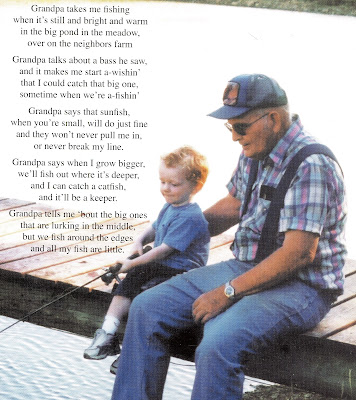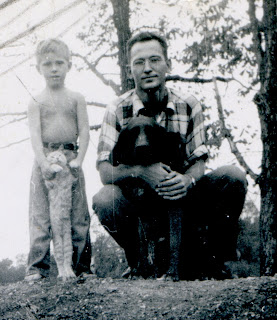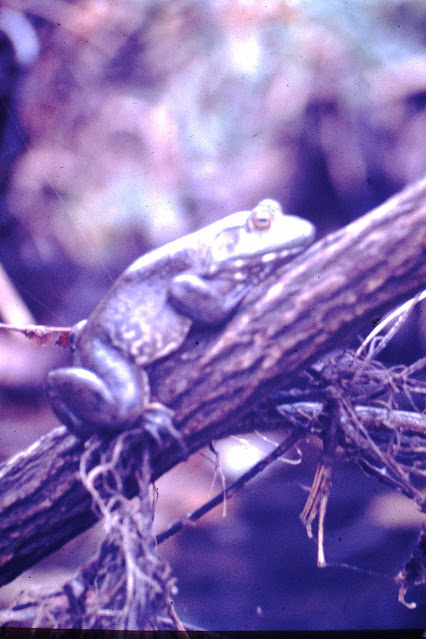 |
| Uncle Norten with a petrified bass |
My uncle Norten has been gone for several years now but I came across this story recently that I thought today’s readers might enjoy. It is almost 20 years old. It is the story of a petrified bass.
Uncle Norten had finally done it… he had come up with a fish story even his buddies at the Lone Pine Restaurant wouldn’t believe. He had them looking at each other with winks and nods as he declared that on a fishing trip just a couple of nights before his nephew had caught a “petrified bass” of better than five pounds. He wasn’t actually lying; it was just a matter of choosing the wrong word!
We had fished most of the night, and by 7:00 a.m. I was bone tired. It was daylight, but the submerged lights on either side of the pontoon boat were still burning, and threadfin shad were circling by the thousands, their masses making a slight whirring, rustling sound in the water around us. The shad nets were so full of shad you could barely lift them out of the water.
I hooked one on to a quarter ounce jig-head I had just tied on, and cast it out away from the boat toward the steep rock bank about thirty feet away. Immediately a fish took it. I set the hook, and the fight was so-so, even though I could see in the clear water that it was a pretty good bass. In fact it weighed a little better than five pounds by my best estimation, even though it fought like a bass half that size.
Examining the fish, I could see why. Apparently it had been injured at one time or another, seriously enough that one side of its body was stiff and inflexible, like it was made from a hard Styrofoam. I called Norten over to look at it, even though he had just landed a nice walleye and was much more interested in it than my rather ordinary bass.
And then he too was amazed. “Never seen nothin’ like it,” he told me. “That bass is stiff as a board. Wonder how he swum like that?”
And that’s when I said it…”Yeah, he’s been injured and those muscles on one side have ‘atrophied’..It’s a wonder he has been able to survive.”
So he was a little miffed at his card-playing friends at the local restaurant. If he said we caught a petrified bass, they ought to believe him, he figured. I bailed him out by coming along a day later and putting an end to the snickers and winks. Uncle Norten hadn’t exactly lied. The fish was atrophied, not petrified. And while they accepted what I said, they weren’t real sure what the difference was either.
Speaking of the old days, when I wrote about my uncle’s boyhood in the Ozarks in the 1920’s and ‘30’s, I realized how hard times were for everyone who lived a country life back then. If you wonder why there were so few deer and turkey back then, stop and think about how hungry people were in the grip of the depression. It wasn’t just the loss of habitat; it was the constant search for something to eat that made turkey and deer so scarce.
You never, ever saw a goose in the Big Piney country where grew up. Lots of ducks stopped on the rivers and ponds in the fall, but almost never any geese. Certainly a nesting Canada goose in the Ozarks each spring was unheard of. Nowadays, there are millions of them it seems, all over the Ozarks, on lakes and rural ponds where they nest and bring off thousands of goslings. In the thirties, those geese would have been treasured table-fare by Ozark people. Now, they are everywhere and no one is that hungry.
But the way things are going now, folks might be about to get that way. I pity city people if times get worse. But here in the Ozarks, there are plenty of deer and geese and squirrels and possums to feed folks who have the genetics of old-time country folks. Those people know how to grow a garden. The only thing we won’t have left to eat is quail and turkeys.
When it gets too hot to go outside, you may need some inside reading to keep you occupied. See my website if you have a computer… www.larrydablemont.com there are 11 or 12 of my books shown there and 88 back issues of my magazines… more reading than you can get done this year.
Or contact me at Box 22, Bolivar, Mo 65613. You can call me at 417 777 5227 or email me at lightninridge47@gmail.com











